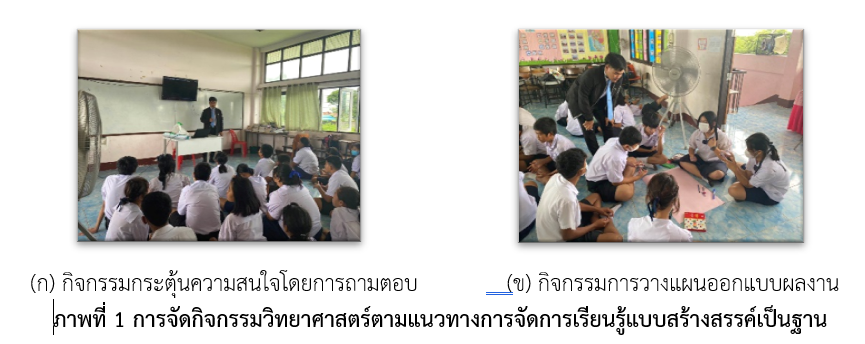ผลของการจัดกิจกรรมวิทยาศาสตร์ตามแนวทางการจัดการเรียนรู้แบบสร้างสรรค์เป็นฐานต่อความคิดสร้างสรรค์ทางวิทยาศาสตร์ของนักเรียนชั้นมัธยมศึกษาปีที่ 1
Main Article Content
บทคัดย่อ
การวิจัยครั้งนี้มีวัตถุประสงค์เพื่อศึกษาผลของการจัดกิจกรรมวิทยาศาสตร์ตามแนวทางการจัดการเรียนรู้แบบสร้างสรรค์เป็นฐานที่มีผลต่อความคิดสร้างสรรค์ทางวิทยาศาสตร์ของนักเรียนชั้นมัธยมศึกษาปีที่ 1 ให้มีคะแนนเฉลี่ยไม่น้อยกว่าร้อยละ 70 การวิจัยนี้เป็นการวิจัยแบบการทดลองขั้นต้น กลุ่มเป้าหมายที่ใช้ในการวิจัยคือ นักเรียนชั้นมัธยมศึกษาปีที่ 1 ภาคเรียนที่ 1 ปีการศึกษา 2565 จำนวน 22 คน ของโรงเรียนมัธยมศึกษาแห่งหนึ่ง ในจังหวัดกาฬสินธุ์ ได้มาจากการเลือกแบบเจาะจง เครื่องมือที่ใช้ในการวิจัยครั้งนี้ ได้แก่ 1) แผนการจัดการเรียนรู้ด้วยกิจกรรมวิทยาศาสตร์ตามแนวทางการจัดการเรียนรู้แบบสร้างสรรค์เป็นฐาน เรื่อง เซลล์ จำนวน 4 แผน 6 ชั่วโมง และ 2) แบบทดสอบความคิดสร้างสรรค์ทางวิทยาศาสตร์แบบอัตนัย จำนวน 8 ข้อ ที่ประกอบด้วย 4 องค์ประกอบ ได้แก่ 1) ความคิดริเริ่ม 2) ความคิดคล่องแคล่ว 3) ความคิดยืดหยุ่น และ 4) ความคิดละเอียดลออ สถิติที่ใช้ในการวิเคราะห์ข้อมูล ได้แก่ ร้อยละ ค่าเฉลี่ยและส่วนเบี่ยงเบนมาตรฐาน ผลการวิจัยพบว่า นักเรียนที่ได้รับการจัดการเรียนรู้ด้วยกิจกรรมวิทยาศาสตร์ตามแนวทางการจัดการเรียนรู้แบบสร้างสรรค์เป็นฐานมีความคิดสร้างสรรค์ทางวิทยาศาสตร์มีคะแนนสูงขึ้น โดยในด้านความคิดริเริ่ม ความคิดละเอียดลออ ความคิดยืดหยุ่นและความคิดคล่องแคล่ว มีคะแนนคิดเป็นร้อย 88.64, 81.82, 93.18 และ 85.23 ตามลำดับ โดยค่าเฉลี่ยรวมทุกด้านของความคิดสร้างสรรค์ ร้อยละ 87.22 ซึ่งสูงกว่าเกณฑ์ที่ตั้งไว้ร้อยละ 70
Article Details

อนุญาตภายใต้เงื่อนไข Creative Commons Attribution-NonCommercial-NoDerivatives 4.0 International License.
วารสารวิทยาศาสตร์และวิทยาศาสตร์ศึกษา (JSSE) เป็นผู้ถือลิสิทธิ์บทความทุกบทความที่เผยแพร่ใน JSSE นี้ ทั้งนี้ ผู้เขียนจะต้องส่งแบบโอนลิขสิทธิ์บทความฉบับที่มีรายมือชื่อของผู้เขียนหลักหรือผู้ที่ได้รับมอบอำนาจแทนผู้เขียนทุกนให้กับ JSSE ก่อนที่บทความจะมีการเผยแพร่ผ่านเว็บไซต์ของวารสาร
แบบโอนลิขสิทธิ์บทความ (Copyright Transfer Form)
ทางวารสาร JSSE ได้กำหนดให้มีการกรอกแบบโอนลิขสิทธิ์บทความให้ครบถ้วนและส่งมายังกองบรรณาธิการในข้อมูลเสริม (supplementary data) พร้อมกับนิพนธ์ต้นฉบับ (manuscript) ที่ส่งมาขอรับการตีพิมพ์ ทั้งนี้ ผู้เขียนหลัก (corresponding authors) หรือผู้รับมอบอำนาจ (ในฐานะตัวแทนของผู้เขียนทุกคน) สามารถดำเนินการโอนลิขสิทธิ์บทความแทนผู้เขียนทั้งหมดได้ ซึ่งสามารถอัพโหลดไฟล์บทความต้นฉบับ (Manuscript) และไฟล์แบบโอนลิขสิทธิ์บทความ (Copyright Transfer Form) ในเมนู “Upload Submission” ดังนี้
1. อัพโหลดไฟล์บทความต้นฉบับ (Manuscript) ในเมนูย่อย Article Component > Article Text
2. อัพโหลดไฟล์แบบโอนลิขสิทธิ์บทความ (Copyright Transfer Form) ในเมนูย่อย Article Component > Other
ดาวน์โหลด ไฟล์แบบโอนลิขสิทธิ์บทความ (Copyright Transfer Form)
เอกสารอ้างอิง
Chaikanya, S. and Saenphandorn, S. (2018). Development of Creative Skills in Science Subject: Interaction in the Solar System. Mathayomsuksa 3 with a creative learning management model as the basis (in Thai). Journal of Roi Et Rajabhat University, 1(1), 157-164.
Deshakupt, P., Yingsuk, P. and Misri, R. (2013). Teaching thinking with integrated teaching projects, skills, and learning. In the 21 (in Thai). Bangkok: The Printing House of Chulalongkorn University.
Dittacharoen, C. and Tananchaiputra, P. (2014). Creative development and academic achievement 6th grade by project-based learning management along the construction line. In programming courses Developing Applied Robotics. Journal of Intellectual Intelligence, 5(2), 205-216.
Guilford, J.P. (1967). The Nature of Human Intelligence. New York: Mc Graw-Hill Book Co.
Junthon, B., Jantarakantee, E. and Weerapaspong, T. (2015). Development of scientific creativity of 11th grade students on equilibrium using scientific inquiry approach (in Thai). Proceedings of 53rd Kasetsart University Annual Conference: Education, Economics and Business Administration, Humanities and Social Sciences; (pp. 228-229). Bangkok: Kasetsart University.
Kaewdok, P. and Sawangboon, T. (2019). A Study of the Learning Achievement and Scientific Creative Thinking of Tenth Grade Students, Using Creativity–Based Learning (CBL): Mixed–Method Research (in Thai). Journal of Educational Measurement Mahasarakham University, 25(1), 206-224.
Lertangkoon, C., Paewponsong, J., Wadeesirisak, S. and Koocharoenpisal, N. (2015). The development of science activity packages on food contaminant testing for the 8th grade students (in Thai). Srinakharinwirot Science Journal, 31(1), 65-82.
Ministry of Education, (2009). Core Curriculum of Basic Education 2008. Bangkok: Cooperative Assembly Printing House. Agriculture Authority of Thailand.
Nuanpong, V. (2010). Development of creativity according to the theory of knowledge creation on inventions from Thai wisdom Crafts 6th Grade (in Thai). Master’s Thesis. Mahasarakham: Mahasarakham University.
Panmani, A. (2014). Train to think, think creatively (In Thai). Bangkok: Chulalongkorn University Press.
Ruechaipanich, W. (2015). Creativity-Based Learning (CBL). Journal of Learning Innovation, 1(2), 23-37.
Boonshu, P., Phetpraphasorn, P. and khoomraksa, B. (2022). Development of science learning activities based on the concept of rat zoo study to strengthen the creative skills of elementary school students (in Thai). Journal of Science and Science Education, 5(1), 107-123
Tidma, P. (2015). Creative development of human body systems through the process of engineering the eye. STEM Approaches (in Thai). Master's Thesis. Phitsanulok: Naresuan University.
Thuwawit, W. and Tharmapatip, J. (2023). Developing scientific creativity and academic achievement of 5th graders using Learning model for scientific creativity: PIEGA Model on electrochemistry (in Thai). Journal of Science and Science Education, 6(1), 135-149.


